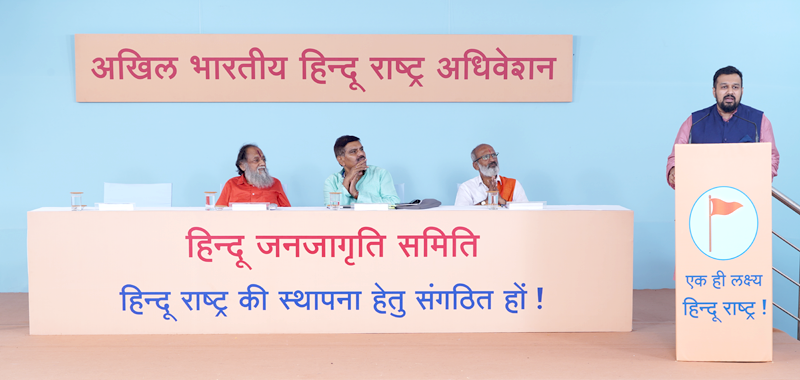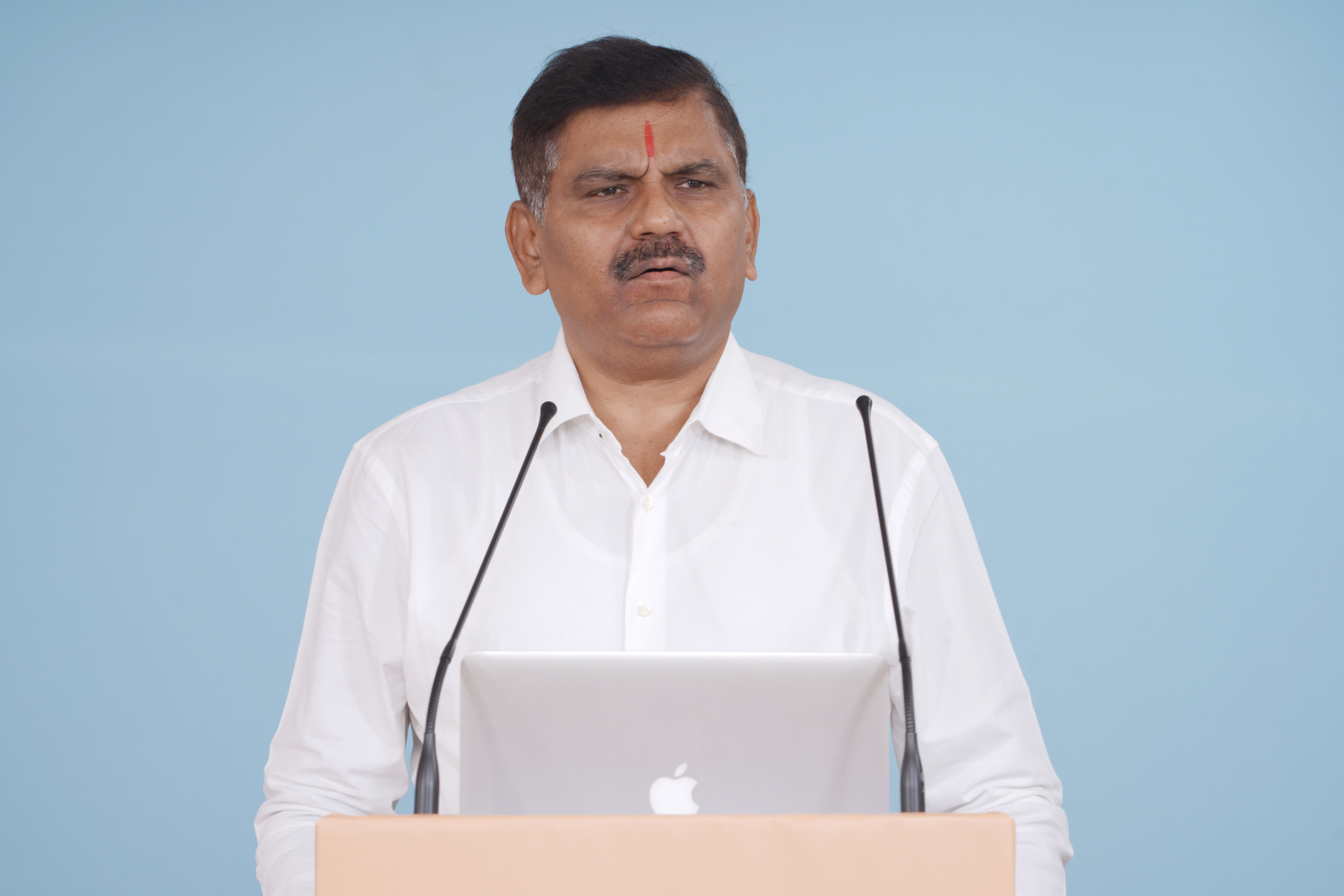
The day is not far when Hindus will be able to offer collective worship at the Kashi Vishwanath Temple! : Advocate Vishnu Shankar Jain, Supreme Court

Ramnathi (Goa) : After all water from the wudu pond of Gyanvapi Masjid was drained for three days in a row, a magnificent Shivling was found in there (wudu pond – a place to wash hands and feet before offering namaz). As soon as I laid my eyes on the magnificent Shivling, I decided that I would not allow any more insults to be heaped on Hindu Deities. The court also allowed for the premises where the Shivling was found to be sealed. The Muslims went to the Supreme Court against this, where the decision was upheld. The day is not far away when Hindus will be able to collectively offer worship at the Kashi Vishwanath Temple, asserted Advocate Vishnu Shankar Jain, spokesperson of the Hindu Front for Justice and Supreme Court Lawyer. He was speaking at the inaugural session of the 10th Akhil Bharatiya Hindu Rashtra Adhiveshan on the dreadful ‘Places of Worship Act’ and ‘Kashi-Mathura Liberation Movement’. Advocate H.H. Hari Shankar Jain of the Supreme Court, Advocate Amrutesh N.P. and Mr M. Nageshwar Rao were present on the dais.
Advocate Vishnu Shankar Jain said,
1. The voice of Hindus was suppressed through the ‘Places of Worship Act’. Due to this law enacted by the then Prime Minister Narasimha Rao in the year 1991, it was decided to maintain status quo in the religious places as they were before 15th August 1947.
2. Under this Act, the status of a religious place cannot be challenged in court. However, the Ayodhya Shri Ram Mandir issue was admitted by the court. This was possible due to awakening in and unity of Hindus .
3. If the case of Shri Ram Mandir can be admitted in the court, then why can’t the case of 40,000 temples converted into mosques by the Mughals be admitted? Hindus need to raise their voice for this.
4. We are also fighting against this law in a legal way. If the status of a religious place is to be maintained as it was on 15th August, 1947 as per Sec 4 of this Act, then it is necessary to first ascertain what the status was as on that date.
5. Merely placing an idol inside a mosque does not make it a temple, similarly, the religious nature of the temple does not change if namaz is offered there. According to Hindu law, the property of a temple belongs to the Deity in that temple. According to this law, all the property of the temple remains with the Deity till the end.
6. On one hand, the Wakf Act empowers the Wakf Board to lay claim on any land, while on the other, the Places of Worship Act offers protection to the Islamic places of worship which were formerly temples. If we compare these two laws, we will see how Hindus are being oppressed under the guise of secularism.
7. My father H.H. (Advocate) Hari Shankar Jain and I have challenged this law in the Supreme Court. This law has snatched away the rights of Hindus to approach the Courts when it comes to Temples. This black law should be repealed by the central government. The Akhil Bharatiya Hindu Rashtra Adhiveshan will play a major role in this. Till this happens, Hindus face an uphill task.
The provisions of the Constitution do not apply to Hindus where they are a minority ! – M. Nageshwar Rao, Former Interim Director General, CBI

Former Interim Director General of the Central Bureau of Investigation (CBI), Shri. M. Nageshwar Rao said, “Hindus have only political rights out of the 5 rights granted under the Constitution; However, Hindus cannot enjoy equal constitutional rights in the areas of religious, cultural, educational and economic freedoms. Hindus have been reduced to second class citizens. Therefore, efforts are required to give equal rights to Hindus. In the 90’s Kashmir witnessed a Hindu genocide. Millions of Hindus were forced to flee, but no one tried to save them. When Hindus become a minority, the provisions of the Constitution of the country do not apply to them. The government does not even support Hindus. There are no Hindu temples in Mizoram, there is 100% Christian population. Hindus are fleeing from states, districts and villages; but the question is, where will these Hindus go? Shri. Rao was speaking on the lack of freedom to follow, practice & propagate Hindu Dharma.
He went on to say,
1. Court bans animal sacrifices at Tripureshwar temple; But in India, millions of animals are slaughtered every day, without restrictions. Prime Minister Narendra Modi had said that we should stop ‘Pink Revolutions’ and bring in ‘White Revolutions’ (increase in milk production); However, given the current situation, India is the second largest seller of meat and beef in the world. 1 lakh animals are killed every day. Subsidies are given for meat exports.
2. Today, being a Christian and a Muslim is like having a license to convert Hindus.
3. Due to the government takeover of temples, Hindus have to pay for everything from placing slippers in front of temples, to having a glimpse of the Deity. Why do Hindus have to pay to meet their own God? In a way, it would not be amiss to say, this jiziya tax is more abhorrent than the jiziya tax imposed by Aurangzeb.
4. Sections 12, 25 and 26 will have to be removed and the Central Temple Act (Central Temple Management Act) will have to be introduced by the Central Government. Through them, the temples will be prised out of government control and their management will be handed to the Hindus.
5. One of the reasons for the failure of such reforms in Hindu Dharma is that Hindus are discouraged from organizing on the grounds that ‘corruption will increase in temples’; But since ancient times, Hindus have managed their temples with utmost honesty. Therefore, efforts should be made through this Adhiveshan so that the temples can be reclaimed by the Hindus without falling prey to such misconceptions.
6. The money received from temples is being used by the governments not for the development of temples but for its own expenses. Therefore, Hindus should make efforts to free the temples from the clutches of the government.
Don’t blindly support the Uniform Civil Code! – M. Nageshwar Rao, Former Interim Director General, CBI
The Uniform Civil Code is being discussed continuously. A majority of the Hindus are in support of the law. But don’t blindly support it without knowing exactly what the law says. We talk about bringing in equality in this country; but how can foxes and deer be bestowed equal rights?
Hindus in the state of Karnataka have taught a good lesson to those who do not accept the Court judgement! – Advocate Amrutesh NP, National Vice President, Hindu Vidhidnya Parishad

Amrutesh NP, National Vice President of Hindu Vidhidnya Parishad said, ‘The anti-hijab movement, which started from the state of Karnataka, later became a national issue. Some Muslim students filed a petition in the Karnataka High Court seeking permission to don the ‘hijab’. While many advocates lined up to fight on their behalf, there were very few advocates to fight on behalf of the government against this petition. At the request of many of my lawyer friends, I decided to take up this case. The decision of the Karnataka High Court in this regard was very instructive. Despite this, the Muslim petitioners did not accept it and went to the Supreme Court against the verdict. It costs a lot of money to fight a case in the Supreme Court. The Muslim petitioners were ready to spend this money. This exposed the conspiracy behind the whole episode. However, the Hindus of Karnataka responded by putting up a show of unprecedented unity. It was decided not to allow people of other religions to set up shops in the vicinity of temples during Hindu festivals. Hindus in the state of Karnataka have taught a good lesson to those who do not accept the court judgement’.




